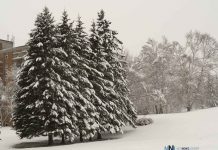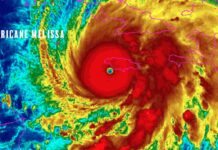THUNDER BAY – CLIMATE – Lakehead University has awarded seven research teams with Year of Climate Action awards worth $5,000 each, which they will use to explore various topics related to climate change.
“Climate research necessarily spans across all disciplines, and I am pleased to see how the YOCA Research Awards support a diversity of research projects from various disciplines at the University,” said Ledah McKellar, Lakehead’s Sustainability Coordinator.
“I am inspired by our faculty and students whose research is devoted to responding to the urgent need for informed climate action, and I am grateful to the Office of Research and Innovation for supporting this research.”
The first team is looking at improving the role and organization of the Keewaytinook Okimakanak (KO) Tribal Council in wildfire evacuations, with a focus on supporting and advancing community self-care and self-determination.
The research team is gathering perspectives, experiences, and recommendations from KO service providers and community volunteers who played a role in the wildfire-driven evacuations of several KO communities in the summer of 2019 and 2021.
This will inform emergency management plans and help identify emergency management practices, policies, and systems that prioritize and honour First Nations self-care self-determination while fostering research partnerships between Lakehead University and Keewaytinook Okimakanak Tribal Council.
The research team is comprised of Dan Duckert, Keewaytinook Okimakanak Tribal Council/Lakehead University; Dr. Lindsay Galway, Department of Health Sciences at Lakehead Thunder Bay; Anjali Mago, Luke Smyk and Josh Taylor, all from Keewaytinook Okimakanak Tribal Council; and Donovan Parenteau, a Lakehead University student in the Faculty of Natural Resources Management.
Dr. Francisco Ramos-Pallares and his research team are looking into developing alternative low-carbon technologies to produce chemicals, which he said is paramount for minimizing the effects of climate change.
For instance, new bioprocesses have emerged to produce bio-based alcohols from biomass that significantly reduce carbon emissions compared to the traditional industrial processes based on the complex conversion of hydrocarbons.
“Currently, my research team and I are investigating the salting-out of alcohols from an aqueous solution. The underlying idea of salting-out is to separate alcohol from an aqueous liquid mixture by adding salt,” said Dr. Ramos-Pallares, Assistant Professor in Chemical Engineering at Lakehead Thunder Bay.
The goal of this project is to understand the physics and chemistry of salting-out and to map the effect of the amount and type of salt added on the purity of the alcohol produced.
To do so, the research team is combining experimental data collection and simulation to shed light on the salting-out phenomenon. The expected outcome is to produce a physically sound model for salting-out-related calculations suitable for the design and simulation of alcohol purification operations in biorefineries.
Dr. Ellen Field, Assistant Professor in Education at Lakehead Orillia, is working with Dr. Muhammad Asaduzzaman, Assistant Professor, Computer Science, on a research project called Benchmarking Climate Change Policies across Canadian School Boards.
The research project, which will run from January-September 2022, will involve developing a web scraping protocol to collect data on climate change policies from school board websites across Canada; quantifying the number of school boards that have developed climate change policies; and publishing a report on climate change policies across Canadian school boards.
Currently, there is limited data as to how the formal education system is responding to climate change, and Dr. Field notes that this study will determine existing policies within school boards.
“After analysis, the findings will indicate where gaps in policy exist both quantitatively, in terms of number of school boards with policies, and qualitatively, in terms of content in climate change policies for ensuring education systems are responsive to preparing young people for the rapid change and uncertainty they will face in the next 30 – 70-plus years,” she said.
Dr. Ahmed Elshaer, Assistant Professor in Civil Engineering at Lakehead Thunder Bay, and his research team will develop tailored solutions to control the influence of climate change – particularly when it comes to the built environment.
“One of the expected impacts of climate change is strong wind events and harsher cold temperatures, which will affect various sectors of our community, such as the Indigenous regions and the mining industry,” Dr. Elshaer said.
“First, we need to quantify this climate impact and estimate the new demand for the structures, and then, develop innovative techniques and solutions to lessen the elevated climate effect. Additionally, existing structures need to be assessed and retrofitted if needed to ensure their resiliency.”
Dr. Liang Cui, Assistant Professor in Civil Engineering at Lakehead Thunder Bay, is leading his research team in a project called Coupled Multiphysics Modeling of Impure CO2 Geosequestration in Deep Saline Aquifers, which involves capturing carbon dioxide in aquifers as a way of reducing greenhouse gases in the atmosphere.
“This research project will expand our knowledge and establish advanced mathematical tools that enable the reliable and accurate evaluation of the performance of impure carbon dioxide geosequestration technology,” Dr. Cui said.
Dr. Robert Stewart, Associate Professor in Geography and the Environment at Lakehead Thunder Bay, and his team will use the grant to develop a paleo-climatic record of the conditions in Lake Nipigon to assess climate change impacts in Biinjitiwaabik Zaaging Anishnaabek Traditional Territory.
Members of Biinjitiwaabik Zaaging Anishnaabek (BZA Rocky Bay First Nation) have long observed changes in the Nipigon Lake Basin that have been shared through verbal and lived histories. It is important for the community to correlate these local observations with common scientific data to enhance communication about climate change and cumulative effects in the traditional territory.
“Through a partnership with Lakehead University, a paleolimnological analysis will help us understand the history of lake conditions before human development, to present day, in order to understand past climate conditions,” Dr. Stewart said.
“With this historical climate record, climate modeling and climate scenarios can be applied to current environmental impacts in order to anticipate future cumulative effects from a changing climate.”
Dr. Elaine Wiersma, Associate Professor in Health Sciences at Lakehead Thunder Bay, and her research team will interview people who are ecological/native species gardeners in Thunder Bay, about their gardening practices, motivations, and understanding of beneficial gardening practices. Photo essays of participants’ gardens will also be included.
Thunder Bay city council’s consideration to amend by-laws requiring residents to maintain turf grass of eight inches – limiting the ability of residents to garden with native species and naturalization – prompted this research.
“The purpose of this research is to explore gardeners’ motivations, perceptions, experiences and practices of ecological/native species gardening in their private gardens,” Dr. Wiersma said.
She and her team will recruit 12 – 15 participants from the city of Thunder Bay. They will use the research findings to provide reports and presentations to various environmental organizations and committees in Thunder Bay, provide information to inform the by-law changes, and develop recommendations to encourage ecological/native species gardening.
“Congratulations to each of the YOCA Award recipients,” said Dr. Andrew P. Dean, Lakehead’s Vice-President, Research and Innovation.
“This year is an extremely important and exciting time at Lakehead University as we embark on concrete actions with regards to addressing climate change. Research, at all levels, will form the basis for us to understand, mitigate, and change our ways with greenhouse gas emissions.”
Lakehead announced 2021/2022 as the Year of Climate Action to build the relationships and platforms necessary to support transformative and ongoing climate action at the University.
YOCA is an invitation to faculty, students, and staff to consider how climate action connects to their work. One of the concrete climate actions that Lakehead committed to during YOCA is internal research grants that support faculty and student research on climate action.
Universities are capable of researching and testing innovative ideas using technology and by exploring theories. This allows professors and students to gather and analyse data that will help equip society to address climate change.







